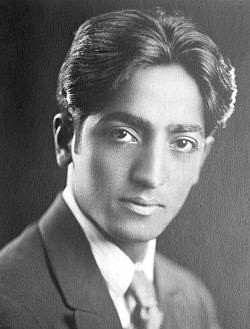Who was Krishnamurti, and what did Alice A. Bailey (AAB) have to say about him? First a little bit about Jiddu Krishnamurti from Wikipedia:
Jiddu Krishnamurti (12 May 1895 – 17 February 1986) was an Indian philosopher, speaker and writer. In his early life he was groomed to be the new World Teacher but later rejected this mantle and withdrew from the Theosophy organization behind it. His subject matter included psychological revolution, the nature of mind, meditation, inquiry, human relationships, and bringing about radical change in society. He constantly stressed the need for a revolution in the psyche of every human being and emphasised that such revolution cannot be brought about by any external entity, be it religious, political, or social.
Krishnamurti was born in British India. In early adolescence he had a chance encounter with prominent occultist and theosophist Charles Webster Leadbeater in the grounds of the Theosophical Society headquarters at Adyar in Madras. He was subsequently raised under the tutelage of Annie Besant and Leadbeater, leaders of the Society at the time, who believed him to be a ‘vehicle’ for an expected World Teacher. As a young man, he disavowed this idea and dissolved the Order of the Star in the East, an organisation that had been established to support it.
He said he had no allegiance to any nationality, caste, religion, or philosophy, and spent the rest of his life travelling the world, speaking to large and small groups and individuals. Many of his talks and discussions were published as transcripts; among them The First and Last Freedom, and The Only Revolution, and also several diaries were published, including Krishnamurti’s Notebook. His last public talk was in Madras, India, in January 1986, a month before his death at his home in Ojai, California.
Krishnamurti’s teachings have had an influence on the thoughts of several notable public figures, including Kahlil Gibran, Aldous Huxley, Henry Miller, Bruce Lee, Jackson Pollock, Philip Guston, David Bohm, Joseph Campbell, Beatrice Wood, Deepak Chopra, Indira Gandhi, and Eckhart Tolle.
Apparently some in the Theosophical Society had big plans for Krishnamurti but he chose not to take that route. It looks like AAB’s comments here largely concern that incident. Below are the three places in the writings of AAB where he is mentioned by name:


